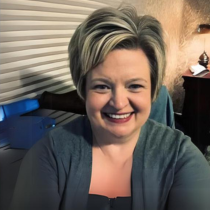Caregiving is one of the most rewarding yet challenging jobs; it requires heart, patience, and a deep understanding of a person’s many needs in gerontology. In essence, they provide the core elements of assistance in daily activities, but care also helps profoundly change older people’s lives by being accompanied and emotionally supported. An aging population will always need caregivers who can help build trust and forge meaningful relationships more than ever.
To make this an even more thought-provoking discussion, we contacted Erin Heath, a senior caregiver at Home Instead. With her many years of caregiving experience, Erin was happy to share how she establishes strong relationships with seniors, overcoming tough situations, and how seniors are respected and empowered, especially when intimate issues must be addressed.
I do my best to meet people where they are and bring my full self into anything I do. I also try to be as flexible as possible and adapt as needed. For example, one senior may be more social and want more companionship, whereas another client may want to be left more alone. I also do my best to listen. A lot. I listen to their life stories, pick up on their values and interests, and weave them into conversations and activities. Most importantly, I respect them as human beings who have had a rich life. I treat them with dignity and talk with them as humans; I acknowledge when something may be awkward, such as bathing, and I validate their experiences.
The most common challenge I have faced is when a client does not want a caregiver. I have had a fair number of clients whose families hired a caregiving service to have respite for the family, or they need another set of eyes for their loved one, and the loved one thinks they can still be completely independent. I employ many of the strategies I mentioned above. I listen, acknowledge the situation, and empathize with their change in situation. I make myself available gently and illustrate the value of having someone there by providing conversation, helping run errands, cleaning, playing games, and making myself available and dependable.
Again, my answer here is similar to the prior ones. I talk through everything I am doing and when during bathing and dressing. I ask them to do what they feel comfortable doing (without pain) regarding bathing and dressing to promote their continued independence, and I complete what they can do. I will reframe using a walker, for example, as something good to have around “just in case” and provide positive reinforcement for its use.
– Erin Heath
It depends on the individual. For those more extroverted, finding those social connections is crucial – whether participating in activities in their care center (if applicable) or their neighborhood senior center or maintaining relationships. No one is too old to make a new friend! There is also anything from doing puzzles (word finds or simpler picture puzzles) to going for safe walks. Going outdoors if it is nice out. Doing even one thing a day can make a huge difference.
Communication and collaboration are so important for consistent and quality care. When working for a service, caregivers must work through their home office and then communicate with the family. At the same time, caregivers will use a notebook to communicate with one another and the family daily. Caregivers also report any observed physical, emotional, or behavioral changes to their home office, which will follow up. Those who go into caregiving are likely to be very empathetic, genuine, and caring by nature and have a heart for seniors. While these qualities serve caregivers very well in what they do, it is still important to remember the importance of boundaries for everyone and to walk that sometimes tricky balance between professional caregiver and companion.
Being a caregiver can be hard work – whether for a family member or working for a service. Yet it is so important, critical, and rewarding work to do, where most days, it doesn’t feel like work! Working with clients, interacting with them, and helping them stay active can do so much for their mental, emotional, and physical health. And I think caregivers benefit just as much through these experiences. I learn something new every day, and I am very thankful to be able to do this work.
As Erin mentioned, caregiving is not just about providing physical assistance but also about listening, empathizing, and creating a sense of dignity and independence for seniors. Whether it’s finding ways to help seniors stay active or collaborating with families to provide the best possible care, caregivers like Erin bring their full selves to the role every day. She makes lives better for seniors and learns and grows with every new client. That essential work leaves a profound impact not just on the seniors but on families relying on her support as well.

Erin Heath is an empathetic and intuitive leader with extensive experience as a part-time senior caregiver at Home Instead, where she worked from 2016 to 2020 and returned in July. Known for her ability to navigate complex situations with grace, tact, and humor, Erin excels at fostering trust and value alignment with her clients. Her approach to caregiving goes beyond meeting physical needs—she focuses on making a meaningful difference in the lives of seniors by ensuring they feel respected and empowered. With aging parents herself, Erin is personally attuned to the challenges of caregiving, managing both its emotional and practical aspects with compassion.